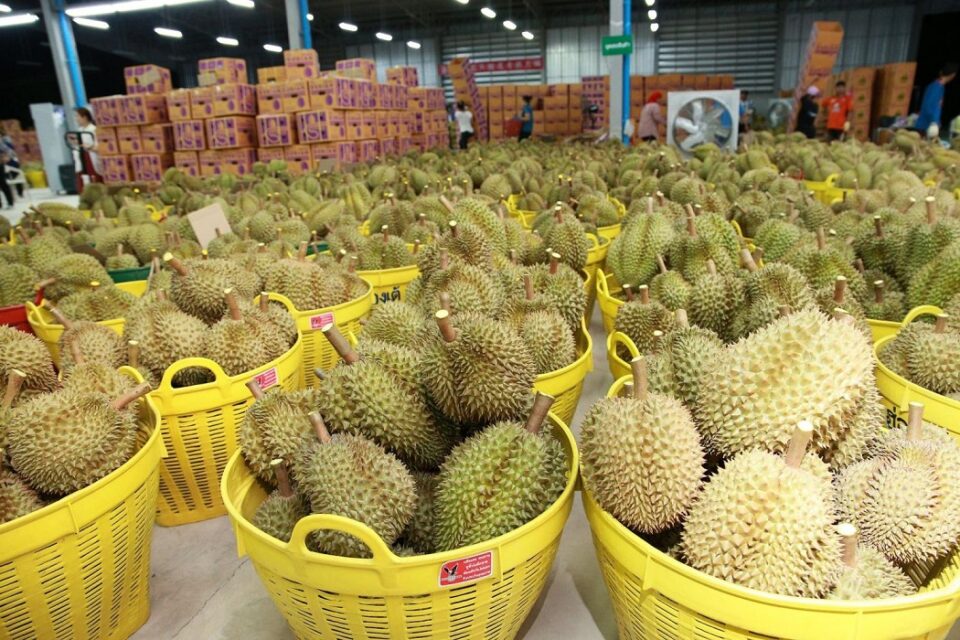Problems persist in exporting fruits to China despite government assurances that all rail and road checkpoints have now been opened, an exporter association said on Friday.
The association urged the government to clamp down on processing factories that are still failing to follow regulations and speed up their negotiation for a Green Lane at China’s land borders for Thai fruits.
“These borders have been opened for a while now but the problem is that there is still a lot of traffic in Youyiguan, Dongxing, and Mohan because of China’s Zero Covid policy,” Sunchai Puranachaikere, the President of Thai Fresh Fruit Traders and Exporters Association, told Thai Enquirer on the phone.
“The traffic can sometimes last up to two weeks so operators are afraid of sending their goods through these checkpoints because their fruits will rot,” he said.
His comment came after Alongkon Phonlabut, an adviser to the agriculture and cooperatives minister, said on Friday that China has now opened all of the land border checkpoints for durian and other Thai fruits.
“This was good news for Thai fruit farmers but all parties must make sure that there is no contamination of Covid-19,” Alongkon said.
China since last year imposed strict Covid rules at its checkpoints in Youyiguan, Dongxing and Mohan causing delays in fruit exports to China.
China also built a plant disease detection area at Mohan railway station and many Thai operators were banned because they have found that a lot of Thai fruits were allegedly found to be contaminated with Covid.
Related Thai government agencies have been negotiating and coordinating with their Laotian, Vietnamese, and Chinese counterparts to gain faster access for Thai fruits via the Nongkhai-Vientiane-Boten-Mohan checkpoint in order to ease the problem.
“The situation might have improved from last year but the same problems at land borders still exist,” Sunchai said.
“Right now, the best mode of transport is via the sea where traders are able to send hundreds of containers per day,” he said.
Around 50 per cent of Thai fruits that are being exported to China are via the sea and 40 per cent are getting there by land. Thailand’s exports of its fruits increased from 91 billion baht in 2020 to 160 billion in 2021 with 100 billion baht being the export of durian alone.
Commerce Minister Jurin Laksanawisit said on Tuesday that the exporting of Thai fruits to China via three main Chinese seaports including Qinzhou Port is becoming more popular and the ministry has instructed farmers, processing factories, and exporters to be more vigilant in preventing Covid contamination to avoid being banned by China.
Sunchai agreed with the government’s push for processing factories to be more vigilant but he also urged the government to better enforce cleanliness and quality control.
“Mohan is keeping a very watchful eye on these fruits so the government should be stricter by temporarily shutting down processing factories that do not follow regulations and help them meet these requirements before they can reopen again,” he said.
Sunchai said the government should better enforce regulations under the Good Manufacturing Practices Plus license since less than 100 out of 400 processing factories that were given the license can actually keep up with the regulations.
“Not that many of them can keep up with the practices and the government should be stricter on this because the ones that violated these rules are still open for operation and they are not improving,” he said.
When asked if shutting down processing factories would affect farmers, Sunchai said it is better than the entire country being banned again.
“If we are not stricter now, the entire country will be banned again, which one should we choose?” he asked.
He also urged the government to speed up its negotiation for a “Green Lane” that the government proposed to China to fast track the export of Thai fruits and ease the restrictions of non-tariff barriers at land borders.





